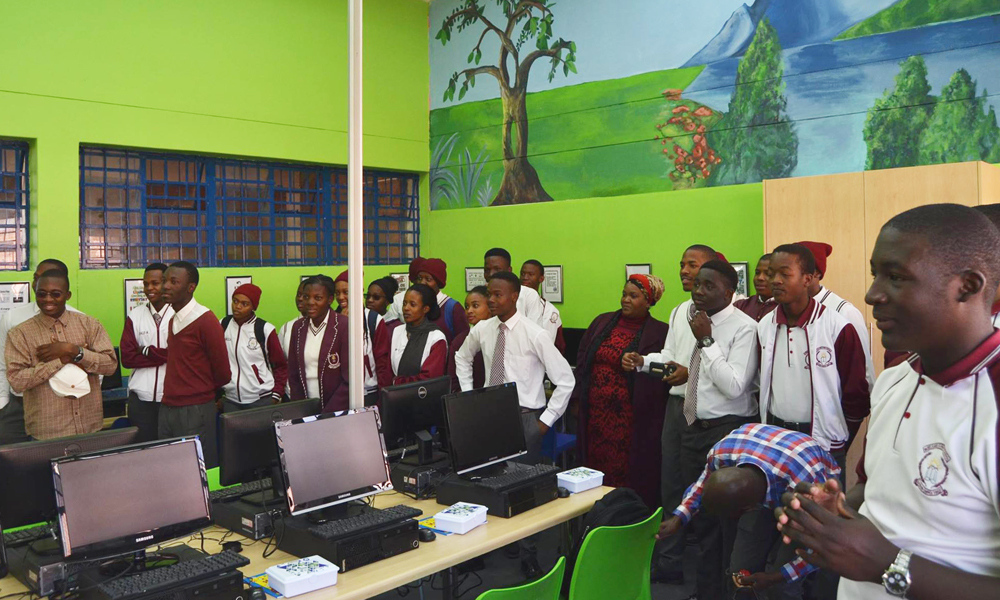
Rosatom Helped Students in South Africa
back to contentsThe new computer center is a gift dedicated to Nelson Mandela International Day established by the UN General Assembly on 10 November 2009 in recognition of the former South African President’s contribution to the culture of peace and freedom. Each year on the 18th of July, Nelson Mandela’s birthday, the UN joins the initiative of the Nelson Mandela Foundation to celebrate this international day by spending 67 minutes – one minute for every year of Mandela’s public service – to help people in need.
Rosatom Africa has celebrated Nelson Mandela International Day, this year dedicated to combating poverty, for the second year in a row.
Recognizing that education will play a fundamental role in the long term alleviation of poverty, Rosatom Africa refurbished and modernized the school’s dilapidated computer center. The company also donated 30 brand-new desktop computers and a smart board to Botlhabelo Secondary School, which is situated in the impoverished township of Oukasie in the North West Province of South Africa. Rosatom renovated the entire center and fitted out the facility with high tech gadgets and safety devices required for the center to become a supportive learning hub. The computer center will give students access to technology and information that has been previously inaccessible for them.
Mr. Semenya, Principal of Botlhabelo Secondary School, highlighted the challenges his students faced when reaching tertiary education without ever having access to computers. “We find that many of our brightest students that reach tertiary institutions struggle as they are required to use computers for most activities, even handing in assignments. We truly believe that this center will have a great impact on their future, and we must thank Rosatom for this.” Nuclear education applications were also installed on the computers to give students an opportunity to study the basics of nuclear plant construction and operation.
“We do believe that Rosatom’s contribution will inspire these young students to develop their computer skills and give them opportunity to reach their full educational potential. Rosatom is a responsible corporate citizen of South Africa for 25 years and we are proud to play our part in the development of this great country,” said Viktor Polikarpov, Rosatom’s Vice President for Sub-Saharan Africa.
In 2016 Rosatom renovated two science labs and purchased critical equipment for Botlhabelo Secondary School (microscopes, Benza burners, test tubes, etc.) With dirt all around, broken windows and busted furniture, the laboratories had been almost unfit for school classes. The available equipment was insufficient to perform even the simplest experiments. Representatives of Rosatom’s regional office tidied up the labs, cleaned and painted the walls, the floor and the ceiling, threw off the old equipment and lined up new furniture.
In addition to the renovation of the premises, Rosatom bought some necessary equipment – microscopes, burners, chemicals for experiments, teaching aids, as well as tables, chairs, etc. Alongside equipment and furniture, the school received books about the Russian nuclear industry and related education.
Rosatom is active in developing the South African education system, organizing student competitions and Olympiads with a tour to Russia as the first prize. Russia signed a number of memorandums in the field of education, staff training and public acceptance of nuclear power, as well as a memorandum on cooperation with the North West University of South Africa.
FOR REFERENCE
South Africa operates the Koeberg nuclear power plant with two pressurized water reactors, 900 MW each. Eskom, a national power monopolist, plans to invest almost 40 billion US dollars in the coal and nuclear power industries over the next five years. Rosatom’s regional office established in 2012 was but a logical step to promote the corporation’s business in the region. Covering both Southern and Central Africa, the office organizes events to raise public acceptance of nuclear power across the African continent.




